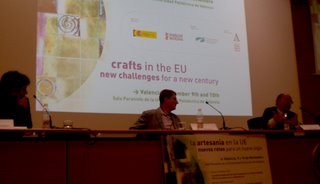
A quarry worker, a maker of hand-made luxury ice cream, a tailor, and a plumber who made ceremonial swords - these were just four of the people who took the floor in the first plenary session of Crafts in the EU - New Challenges for a New Century.
Today the Craft Research blog is reporting from Valencia, Spain at the end of the first day of this pan-European conference on the future of craft in Europe. I am speaking tomorrow afternoon, towards the end of this two day event organised by Fundacion Espanola para la Innovacion de la Artesania. The organisers are to be congratulated on pulling together speakers from eleven different EU countries, all covering a range of engaging issues. But most particularly they are to be commended in succeeding on what so often alludes us in the UK - attracting practitioners from the full range of craft practices: art-craft makers through to artesans.
This seemingly eclectic mix reflects the different cultural and economic conception of "the crafts" in the south of Europe, compared with the north - itself reflecting different economic structures. It makes for some spirited exchanges, and brings home the rich cultural diversity of Europe.
Spain is at a turning point in the development of higher education and - in particular - provision for art, design and craft. This conference is helping to inform that debate, and to place it in the context of perspectives and experiences from across the EU.
The morning started on a postitive note, with a government spokesperson arguing that while craft is not properly considered in Spain, there is an urgent need to recover the craft industry's reputation, to revalue skills and embrace new business strategies. All well and good. But then the following speaker claimed that "craftsmanship needs to be understood in terms of heritage".
There is a tension in the conference (a healthy tension) between a heritage/tourist development conception of craft, and a more future-focussed consumer-savvy view. In part this cuts as a north-south divide - but that would be to overly simplify some complex issues. There are some views expressed worth taking issue with, while others make postivie points with exceptional eloquence. The conference chair - Professor Jesus-Angel Prieto - in introducing the morning's main themes said "hands generate thought - they are a form of thought".
My personal highlight of the day was Rory O'Connor of marketing consultancy True Potential in Ireland. He presented a market analysis of craft in Ireland and the market oppportunities facing practitioners. There was a clarity in the analysis and sense of future direction that was refreshing. "Craft makers," said Rory "don't provide the stories; they don't make the offer". Pointing out that the craft sector effectively competes both with low cost producers in the far east and large multinationals, he set out the challenges - but, importantly, suggested economic ways forward for the sector.
This is a conference on policy and strategies for the crafts, and as such it is very welcome and timely. Comments from some of the speakers - and indeed from many on the floor - suggest that for significant sectors of the 'craft industry' there is no sustainable future unless radical action is taken to provide new business models, marketing strategies, and professional development. However, evidence from Germany, Finland, the UK and Spain itself is suggesting strategies that may have wider application across the EU. So, let us see how the discussions go tomorrow.
Now apparently there is a live webcast of the conference somewhere. My task this evening is to track down the URL for it. Watch this psace.
No comments:
Post a Comment